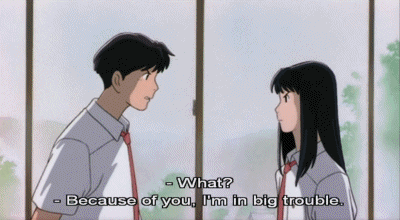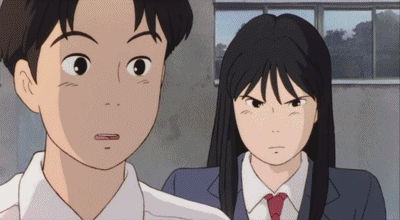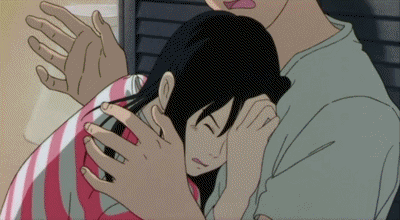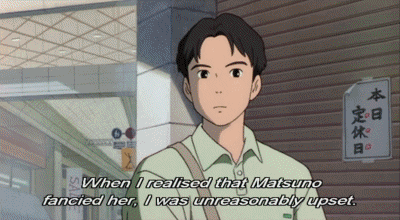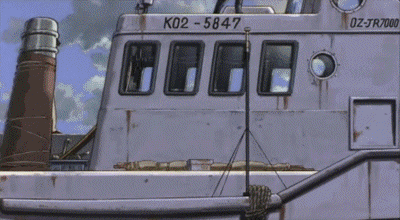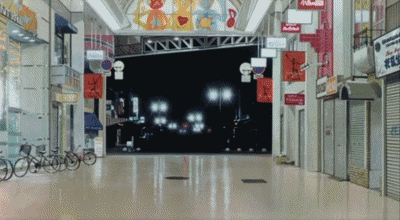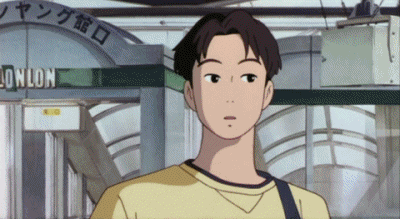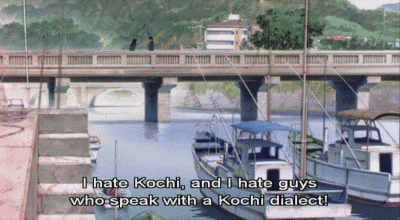ZombiePlatypus
Member
Saw this last night. Lemme start off by saying that the movie looks beautiful. It's very, simple and minimal looking. But has that hand-drawn 90's anime aesthetic. Even the concept art with the markers is great.
We watched the remaster on bluray, and some of the scenes really look like they have a visible difference between the background and the celluloid animation sheets. And I mean this in the best way. Visually it just looks so endearing.
BUT, I've never been so confused by the intent of a movie. For those that haven't seen it, this is about three school-kids: Two boys who are friends and a girl. There's a love triangle, but [SPOILERS!] it's not really amped up or a thing that goes anywhere. It's more about the dynamics and relationship with one of the guys and the girl. The other dude is more background material. This would be all well and fine. However, the movie goes out of its way to make sure all three characters are completely unlikable.
The girl is shown blatantly and over and over to be selfish, inconsiderate, mean, spoiled, bratty, and immature. And it's not even played up in a hammy manner like in fan-service-y tsundere anime. She's just a bad person. She keeps getting into sticky situations cause of her crap decisions, and repeatedly calls on the one guy to help her out of it. Usually at his expense in some manner. And...he keeps obliging and being complicit. (While staying cemented in the friend-zone mind you.) As she keeps being awful, both dudes start talking about how much they, uh, love her for whatever reason, and keep enabling her.
I kept waiting for some sort of character growth to occur. But it literally doesn't happen. They just all stay in that state. Then the movie fast-forwards ten years, and during their reunion, the one dude reminisces about her. At this point, the movie literally shows all the times she was awful and shitty towards him while endearing music is playing and he's swooning. After which he hilariously proclaims that he loves her and wants to see her. Then they run into each-other and that's it.
It's like they told the first half of a story and then just figured you'd imagine the other half? We're just suppose to assume they all grew as people?
I watched a behind the scenes featurette trying to get an idea of what they were trying to convey with the film. Apparently this was a project done by, at the time, the more novice , younger staff at Ghibli to get their feet wet. (Frankly Ghibli should have been doing stuff like this continuously to prep the next generation.) However, they keep making note about how they had total creative freedom and no supervision. That's the only explanation I can piece together as to why this movie turned out the way it did.
We watched the remaster on bluray, and some of the scenes really look like they have a visible difference between the background and the celluloid animation sheets. And I mean this in the best way. Visually it just looks so endearing.
BUT, I've never been so confused by the intent of a movie. For those that haven't seen it, this is about three school-kids: Two boys who are friends and a girl. There's a love triangle, but [SPOILERS!] it's not really amped up or a thing that goes anywhere. It's more about the dynamics and relationship with one of the guys and the girl. The other dude is more background material. This would be all well and fine. However, the movie goes out of its way to make sure all three characters are completely unlikable.
The girl is shown blatantly and over and over to be selfish, inconsiderate, mean, spoiled, bratty, and immature. And it's not even played up in a hammy manner like in fan-service-y tsundere anime. She's just a bad person. She keeps getting into sticky situations cause of her crap decisions, and repeatedly calls on the one guy to help her out of it. Usually at his expense in some manner. And...he keeps obliging and being complicit. (While staying cemented in the friend-zone mind you.) As she keeps being awful, both dudes start talking about how much they, uh, love her for whatever reason, and keep enabling her.
I kept waiting for some sort of character growth to occur. But it literally doesn't happen. They just all stay in that state. Then the movie fast-forwards ten years, and during their reunion, the one dude reminisces about her. At this point, the movie literally shows all the times she was awful and shitty towards him while endearing music is playing and he's swooning. After which he hilariously proclaims that he loves her and wants to see her. Then they run into each-other and that's it.
It's like they told the first half of a story and then just figured you'd imagine the other half? We're just suppose to assume they all grew as people?
I watched a behind the scenes featurette trying to get an idea of what they were trying to convey with the film. Apparently this was a project done by, at the time, the more novice , younger staff at Ghibli to get their feet wet. (Frankly Ghibli should have been doing stuff like this continuously to prep the next generation.) However, they keep making note about how they had total creative freedom and no supervision. That's the only explanation I can piece together as to why this movie turned out the way it did.
And why Ghibli apparently gave up on the next generation to carry their torch afterwards.






